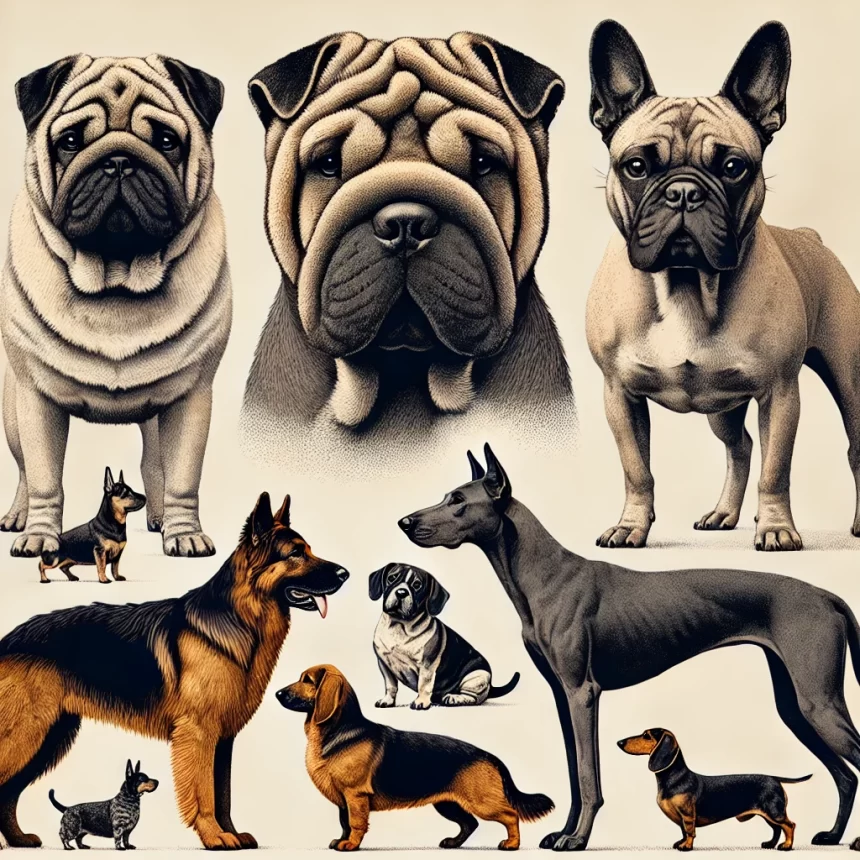In a recent viral TikTok video, British veterinarian Alex Crow, the Chief Veterinary Officer for Net Vet, has issued a warning about certain dog breeds that he would personally avoid owning. His concerns are based on common health issues these breeds face, which can lead to significant veterinary expenses and emotional distress for pet owners. Crow’s expert opinion has sparked a discussion about the implications of breeding practices on the health and well-being of these animals.
Shar Pei: One of the breeds Crow highlighted is the Shar Pei, known for its characteristic deep wrinkles. While these wrinkles make the breed distinctive and adorable to many, they can cause significant health issues. The folds can trap bacteria, leading to frequent skin infections and ear problems. Shar Peis are also at risk for a condition known as “Sharpei fever” and often require surgical correction for eyelid issues. According to Crow, these health problems can result in ongoing challenges for both the dog and its owner.
Flat-faced Breeds (French Bulldogs, Pugs, Bulldogs): Crow also pointed out the health risks associated with flat-faced breeds such as French Bulldogs, Pugs, and Bulldogs. These breeds have a compressed airway due to their facial structure, which makes them prone to breathing difficulties, overheating, and acid reflux. They often require costly and invasive surgeries to address these issues. Additionally, these dogs are susceptible to skin and ear infections, allergies, spinal problems, and eye issues, adding to the potential list of health concerns.
German Shepherd: German Shepherds, while known for their intelligence and versatility, come with their own set of challenges. Crow noted that owning a German Shepherd can be high-maintenance due to their need for significant exercise and mental stimulation. Without proper care, they can become anxious and develop behavioral issues. Furthermore, German Shepherds have a genetic predisposition to hip and elbow dysplasia, which can lead to mobility problems as they age.
Great Dane: Known as “gentle giants,” Great Danes are beloved for their affectionate nature but are susceptible to a serious heart condition known as dilated cardiomyopathy. Their large size also contributes to a shorter lifespan, typically averaging around 7-8 years. Crow expressed that it can be emotionally challenging to say goodbye to these dogs after such a short time, given their lovely temperament.
Dachshund: Dachshunds are popular for their unique body shape, with long backs and short legs, but this distinctive feature makes them prone to serious health issues. They are at risk for back problems such as slipped discs and commonly suffer from joint issues and progressive retinal atrophy, a genetic eye disorder. Crow emphasized that while Dachshunds often have charming personalities, their body shape predisposes them to various health problems, raising concerns about how they have been bred over time.
Crow’s warnings highlight a broader issue within the dog breeding industry, where certain physical traits are often prioritized over the health and well-being of the animals. He stresses the importance of responsible breeding practices and advocates for better education and stricter regulations to prevent these health problems from persisting in certain breeds. The goal is to ensure that dogs are bred in a way that prioritizes their health and quality of life rather than just aesthetics.
In summary, while all dog breeds have their own set of health concerns, the breeds listed by Alex Crow are particularly prone to serious issues due to selective breeding practices. Potential dog owners are urged to consider these factors carefully and opt for breeds that are less likely to suffer from inherited health problems. Crow’s insights serve as a reminder of the responsibilities that come with pet ownership and the importance of choosing a breed that aligns with both the owner’s lifestyle and the dog’s long-term health.

















